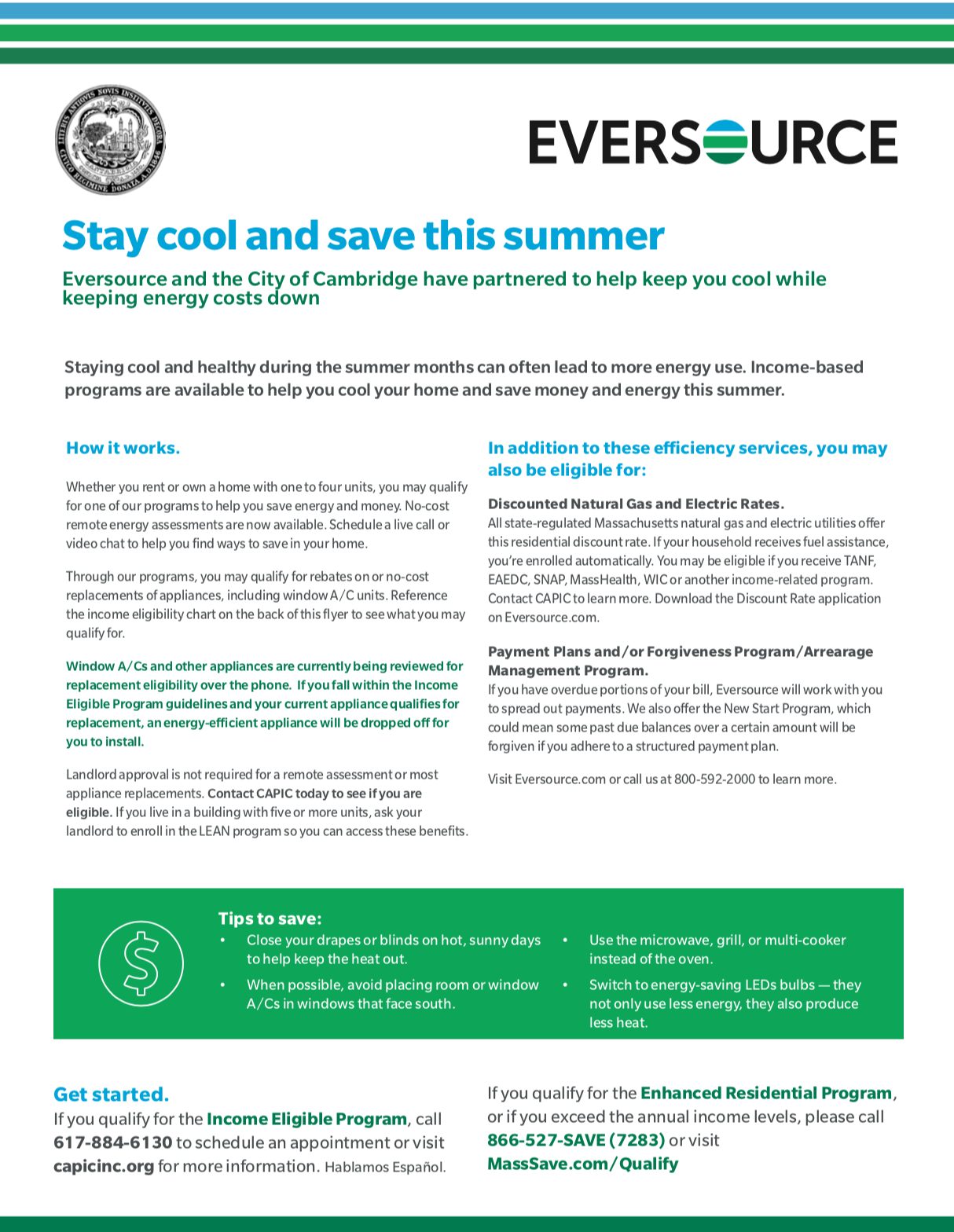Hot weather and extreme heat can cause serious illness and be life-threatening, and every year we see more and more extreme heat days. This summer, Cambridge–like so many other communities across the nation — will need to manage and prepare for hot weather and extreme heat as well as continuing to manage COVID-19.
COVID-19 presents particular challenges in the summer since places where people in Cambridge generally go to cool off, including cooling centers, libraries, and malls are likely to remain closed. Finding ways to stay cool and safe, both at home and outside, are more important this summer than ever.
- Know the signs of heat-related illnesses. Headaches, dizziness, nausea, confusion, cramps, high body temperature, or a fast pulse are among the signs of heat-related illness.
If you are experiencing any of these symptoms, seek medical help immediately and move to a cooler place. Learn more. - Stay hydrated. Keep drinking water, even if you don’t feel like it. Drink two to four glasses of cool fluids every hour.
Avoid alcoholic drinks and too much caffeine and sugar.
Bring water with you wherever you go outside since public water fountains are currently turned off due to the COVID-19 pandemic. - Protect yourself from the sun. Use sunscreen that is SPF 15 or higher and look for those that say “broad spectrum” or “UVA/UVB protection” on their labels.
Wear loose-fitting and light-colored clothing to keep cool. You can also wear a hat and sunglasses.
Plan ahead. It’s important to plan ahead if you are going to stores or supermarkets. Capacity limitations in stores might mean that you have to wait outside in the sun. Try to plan shopping trips early in the morning to avoid the hottest part of the day. - Don’t forget to wear your mask or face covering. Switch to a cotton bandana if your face mask is too heavy or thick to wear in the heat.
If you are feeling overheated while wearing your mask, take it off for a moment and breathe making sure that you are six feet apart from others. Be sure to put it back on when you are ready to continue. Learn more about wearing a face covering safely in hot weather here. - Stay cool indoors. Close windows and blinds during the day.
Take cool showers.
Use air conditioning or fans. However, when the temperature is in the high 90s (or higher than 32.2ºC), fans will not prevent heat-related illnesses. If you are concerned about the cost of running your air conditioner, check to see if you are eligible to receive a discounted electricity rate from Eversource to help lower your electricity bills. Contact Cambridge Fuel Assistance at 617-349-6252 to see if you qualify. - Limit outdoor activities to mornings and evenings when it is cooler. Be sure to decrease your overall level of physical exertion.
- Be a good neighbor. Be sure to check on neighbors, especially the elderly, those who live alone, those with medical conditions, those who may need additional assistance, and those who may not have air conditioning. You can call, text, video call, or meet by staying 6 feet apart.
- Children and pets should not be left in cars. Never leave children or pets in a car unattended, even if running out for curbside pickup or other quick errands. Interior temperatures can rise almost 20°F within 10 minutes even with the windows cracked open.
- Call 911 in an emergency. If you or someone is showing signs of heat stroke call 911 immediately. Signs of heat stroke include:
A body temperature over 103 degrees; hot, red, dry, or moist skin; a rapid and strong pulse; and possible unconsciousness.
While waiting for help to arrive, move the person into a cool area, help cool them down with wet towels or a cool bath, and DO NOT give them fluids. It is safe to call 911 and go to the hospital during this COVID-19 time.
-
Before a Heatwave
- Keep the sun and heat out! Weather-strip doors and sills to keep cool air in on hot, humid days. Cover windows that receive morning or afternoon sun with drapes, shades, or awnings. Reflect heat back outside by installing temporary window reflectors between windows and drapes, such as aluminum foil-covered cardboard.
- Lower your electric bill!
See if you qualify for a discounted electric rate from Eversource, which is available to customers with low incomes and who receive fuel assistance or benefits from other programs, like MassHealth, SNAP, or WIC. Lower electric rates can ease the financial burden of turning on your A/C. Take advantage of energy-saving programs from Eversource and Mass Save. Eversource Income Eligible Programs.
- Get the most from your A/C! If buying a new air conditioner, look for one that is ENERGY STAR certified and make sure it is appropriately sized for the room you plan to use it in. Mass Save is currently offering a $40 rebate for qualifying ENERGY STAR rated room air conditioners. Check your air conditioner and designate a “cool” room where you and household members will be spending most of your time. Window A/C units are sized for the size of the room they are cooling. An improperly sized A/C unit will operate inefficiently and may be less effective at lowering humidity. The US Department of Energy recommends 20 BTU per square foot, as a rule of thumb. Be sure to safely secure window units and insulate any gaps between the unit and the window frame. If possible, place the A/C on a north-facing wall that is shaded, so that it can run efficiently and effectively.
- Make a plan with your friends, family, and neighbors
Plan ahead. If you live alone, ask a friend or neighbor to check in on you when it’s hot out. If you live alone and do not have air conditioning in your home, make a plan with family, friends, or neighbors for how you will cool off during a heat wave.If you know someone who lives alone, offer to check in on them and help them make an extreme heat plan.
- Consider installing air source heat pumps.
If you’re looking for a more permanent cooling solution, consider installing an air source heat pump, which can provide efficient cooling and heating. Find out more about air source heat pumps here.
- Spend time in air-conditioned spaces.
If you are age 60 or older, have been sick recently, have suffered from previous heat-related illness or live alone, it is strongly recommended that you spend a few hours in air conditioning each day during a heat wave.
- Use fans safely. Fans are not effective at reducing heat illness over 95 degrees. If air conditioning is not an option in your home, here are a few tips to use fans more safely and effectively: 1) Use your fan in or next to an open window. Never use a fan in a room without ventilation to the outside. 2) At night, use a fan to bring in cool air from outside. During the day, turn the fan around to vent hot air out during the day. 3) Don’t use a fan to blow directly on you when temperatures are 95 degrees or higher. This can increase your temperature and lead to heat exhaustion. 4) Don’t use a fan anywhere near water.
- Stay on your lowest floor and out of the sun, especially If you do not have air conditioning.
- Take a cool shower or bath to lower your body temperature.
- Use your stove and oven less to maintain a cooler temperature in your home. Try cooking with a microwave, crock pot, or toaster oven. Avoid running other heat-generating appliances, like your dishwasher or dryer, during the hottest part of the day.
- Check on family, friends, and neighbors regularly, especially the elderly, those who live alone, those with medical conditions, those who may need additional assistance, and those who may not have air conditioning.
During a Heatwave

